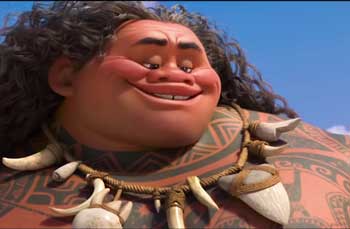
AUCKLAND (Waateanews/ Pacific Media Watch): The depiction of Pacific and Māori folklore demigod Maui in a new Disney movie has received controversial debate with some critics saying it enforces negative stereotypes.
The animated character of Maui in the up-coming film Moana has been referred to as “obese”.
In an interview with Waateanews, the chair of the Pacific Islands Media Association (PIMA) Will 'Ilolahia said it was typical American stereotyping.
“Well, I think we all know at the time of the existence of Maui that obesity didn’t exist,” he told Waateanews.
“All our different cultures have Maui in our folklore, and he has been depicted as a person of strength, magnitude and a person of a godly nature.
“This depiction of Maui being obese is typical American stereotyping in regard to how they see our people.
“Obesity is a new phenomena because of the First World food that has been stuffed down our throat.”
Despite the look of the character, he said he hoped the final release of the movie in November would show Maui as his true character.
Listen to the full interview with Will 'Ilolahia on Waateanews.
Manukau East MP, Jenny Salesa, has also spoken on social media criticising the representation of Maui.
"When we look at photos of Polynesian men and women from the last 100 to 200 years, most of our people were not overweight and this negative stereotype of Maui is just not acceptable - no thanks to Disney,” she wrote on her Facebook page.
However there are differing views.
European standards
An article published on thespinoff this week said the controversy around Maui’s size only reinforced a very modern concept of health and beauty referring to the desired standard of the "European God like Hercules".
“I get more of a ‘strong, bodyguard-type’ vibe,” the article stated.
“Which is interesting, given that a number of people have noted that Maui looks like their Dads and Uncles.
"Imagine what this might mean to Polynesian kids, to have a brief escape from their Dads’ likeness being limited to anti-smoking campaigns, and finally seeing an iteration of large, strong Polynesian men on the big screen, navigating oceans and bringing joy to young audiences."
This work is licensed under a Creative Commons Attribution-NonCommercial 3




